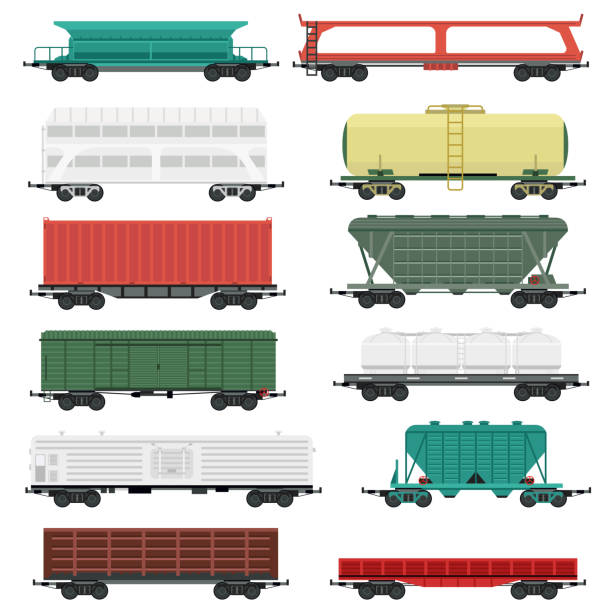Rail Service
Rail Service
Introduction to Rail Service:
Rail freight, also known as rail cargo, involves the transportation of goods by train. It plays a crucial role in the global supply chain, providing a reliable and sustainable alternative to other modes of transport. Rail freight is particularly well-suited for transporting large quantities of goods over long distances.
Advantages of Rail Service:
Cost-Effective: Rail freight is often more cost-effective than other modes of transportation, especially for large and heavy shipments. Trains can carry substantial loads, making them an economical choice for businesses looking to transport goods in bulk.
Energy Efficiency: Trains are known for their energy efficiency. Compared to trucks and airplanes, trains have a lower carbon footprint per ton-mile, making rail freight a more environmentally friendly option for certain types of cargo.
Capacity for Bulk Cargo: Rail freight is particularly well-suited for transporting bulk cargo such as coal, minerals, and agricultural products. Specialized railcars can handle large volumes of these commodities efficiently.
Consistency and Reliability: Rail transportation operates on fixed schedules and dedicated tracks, providing a high level of consistency and reliability. This can be advantageous for businesses that require predictability in their supply chain.
Types of Rail Freight:
Intermodal Transportation: Rail freight often integrates with other modes of transport in intermodal systems. Containers can be seamlessly transferred between trains, trucks, and ships, providing a seamless and efficient logistics solution.
Containerized Freight: Railways are crucial in the movement of standardized containers. This is especially important in international trade, where containers can be easily transferred between trains and ships, facilitating the smooth flow of goods across borders.
Automotive Transport: Rail freight plays a significant role in transporting automobiles and automotive components. Dedicated rail services are designed to handle the specific requirements of the automotive industry, ensuring the efficient movement of vehicles.
Chemical and Hazardous Materials: Rail freight is well-suited for transporting chemicals and hazardous materials. Specialized railcars equipped with safety features are designed to handle these types of cargo securely.
Challenges in Rail Freight:
Infrastructure Constraints: The efficiency of rail freight is heavily dependent on the quality and capacity of rail infrastructure. Upgrading and maintaining rail networks can be a significant challenge in some regions.
Flexibility and Last-Mile Connectivity: While rail is efficient for long-haul transportation, it may face challenges in providing last-mile connectivity to certain destinations. This is where intermodal transportation becomes crucial to bridge the gap.
Speed in Comparison to Air Freight: While rail freight is faster than sea freight, it is generally slower than air freight. This can be a limitation for time-sensitive shipments that require rapid delivery.
Rail freight is a key player in the transportation of goods, offering a cost-effective and environmentally friendly solution for businesses. Its ability to handle bulk cargo, its energy efficiency, and its role in intermodal transportation make rail freight an essential part of the global logistics landscape. Despite challenges, ongoing investments in rail infrastructure and technological advancements continue to enhance the efficiency and competitiveness of rail freight services.
Rail freight is an excellent choice for businesses looking for sustainable transportation solutions. It reduces carbon emissions and contributes to environmental conservation. Rail services offer high capacity, allowing larger volumes of cargo to be transported in a single trip. Moreover, rail transportation is known for its reliability and security, minimizing risks of delays and damage compared to other modes of transportation.
We understand that each industry has unique transportation requirements. Our team of logistics experts works closely with you to develop customized rail solutions tailored to your industry needs. We optimize routes, provide specialized equipment, and ensure efficient rail operations to streamline your supply chain and maximize efficiency.

Real-Time Tracking and Visibility
Our advanced tracking systems provide real-time visibility into the progress of your rail shipments. With our user-friendly online platform, you can track your cargo, access estimated arrival times, and stay informed throughout the transportation process. This visibility empowers you to make informed decisions and proactively manage your supply chain.
Compliance and Safety
We prioritize the safety and security of your cargo during rail transportation. Our team strictly adheres to safety protocols and industry standards to mitigate risks and ensure the protection of your goods. Additionally, we stay updated with the latest regulations and compliance requirements to ensure that your shipments are fully compliant with all legal and regulatory obligations.

When it comes to freight transportation, RTS is your trusted partner. We provide efficient, reliable, and customized solutions for ocean, road, and rail shipments. With our commitment to customer satisfaction and industry expertise, we streamline your logistics operations and ensure your goods reach their destinations seamlessly.
Contact us today to discuss your specific freight needs, and let our team create a customized transportation solution that aligns with your business goals.